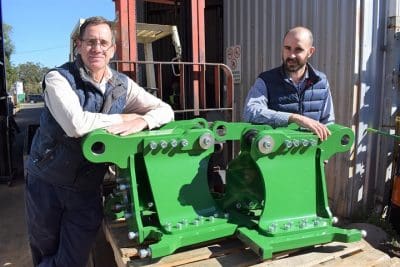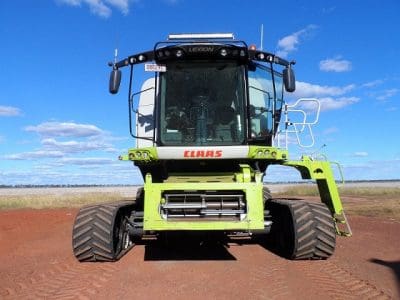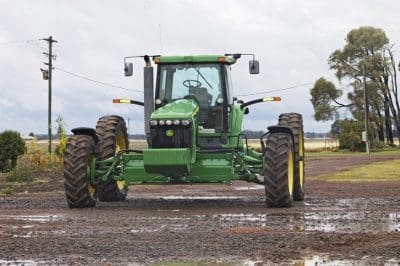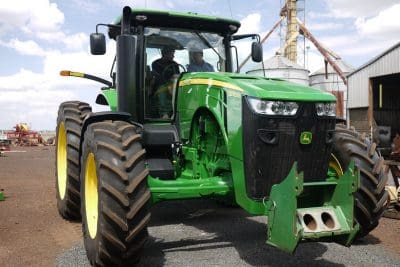THE controlled traffic farming (CTF) revolution has proven a windfall for Toowoomba-based manufacturing company, C & C Machining and Engineering, with its Widetract range of machinery extensions for modifying equipment to fit CTF tramlines now a key product line.

C & C Machining and Engineering sales manager, Shane Dick, and marketing and product development manager, Ranald Cilento, with a John Deere three-metre ILS (Independent Link Suspension) extension kit.
There has been a steady growth in demand, particularly from cotton and grain producers, for extension kits that widen the wheelbases of farm equipment to match CTF layouts.
When the business started doing extensions for CTF 25 years ago, it began manufacturing ‘cotton reel’ wheel spacers before expanding into the supply of more sophisticated, engineered beam axle extensions.
C& C Machining and Engineering marketing and product development manager, Ranald Cilento, said they moved into engineered beam axle extensions because they were much stronger than wheel spacers.
“The wheel spacers were destroying the hubs and planetaries on the tractors they were put on. They were an easy solution, but not an ideal one,” he said.
“Twenty-five years later we are doing things like John Deere CP690 cotton baler rear axle extensions, four-metre John Deere extensions, four-metre Claas harvester extensions.”
Mr Cilento said while three-metre CTF systems were the most common, particularly in the dryland farming sector, there was increasing interest in four-metre layouts.
“It is starting to become more popular with people matching equipment to harvesters. But the engineering requirements for four metres are much more extreme. There is more stress on the machines,” he said.
“You shouldn’t run wheel spacers on four metres. You have to come up with an engineered solution which we have done for a few machines.”
Mr Cilento said some of the newer tractors were going to an independent front suspension, so the company has had to design bolt-in kits for those tractors. John Deere and Fendt have that style.
“We have spent the last couple of years doing an intensive R&D program where we have come up with some innovative products that have been tested and are working well,” he said.
While about half the farmer clients arrange for a dealer to do the fit out of the extension kits, the other half were happy to do it themselves in their own workshops.
“It depends on what they are buying. Farmers will usually fit wheel spacers themselves because it is pretty straight forward. But, some of the bigger kits, such as fitting a rear axle kit to a cotton harvester, are a bigger job,” he said.






HAVE YOUR SAY